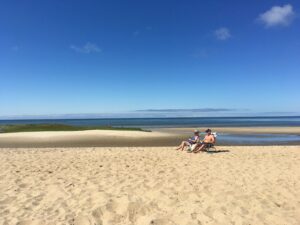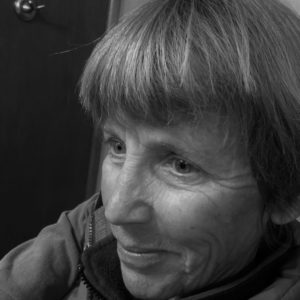 It’s been 270 million years since Flagstaff might have advertised itself as a beach destination. Not the kind with vendors and umbrellas, boardwalks and roller bladers, people large and small squirming with sunburn and spilling out of their swimsuits. No humans—no mammals at all—no birds, not even dinosaurs roamed these shores. The ocean’s evidence is there in the top layer of the Grand Canyon, the Kaibab layer where, if you poke around and keep your eyes open you can find once-living treasures turned to stone. Perfect scallop shells or their bi-valve ancestors; brachiopods the size of two fists; delicate sponges printed like lace on a limestone outcropping near the head of the Hermit Trail.
It’s been 270 million years since Flagstaff might have advertised itself as a beach destination. Not the kind with vendors and umbrellas, boardwalks and roller bladers, people large and small squirming with sunburn and spilling out of their swimsuits. No humans—no mammals at all—no birds, not even dinosaurs roamed these shores. The ocean’s evidence is there in the top layer of the Grand Canyon, the Kaibab layer where, if you poke around and keep your eyes open you can find once-living treasures turned to stone. Perfect scallop shells or their bi-valve ancestors; brachiopods the size of two fists; delicate sponges printed like lace on a limestone outcropping near the head of the Hermit Trail.
That’s all the ocean we have at the moment, but these remnants remind me of a time long past, held in place like a fossil itself. Those muggy hot summer days of late June, early July, when my mother fired up the Rambler and dragged us kids off to the beach. Five of us, ages three to fifteen, all in different moods, complaining from the back seat, fiddling with the radio in the front. The Rambler had a third seat facing backwards where you could sit and make faces at the driver in the car behind you, but not for long. Everyone who sat back there got carsick.
These were the days before sunscreen, a time when white people didn’t want to look white. I still remember the smell of my mother’s Bain de Soleil tanning lotion. She slathered us with baby oil tinted with iodine, drawing from what ancient wisdom I’ll never know. The day after the beach was always one of remarkable pain and sizzling hot red skin, but a few days later, off we’d go again to leave our footprints in the same wet sand.
The sand in the suits, the pain of sunburn, the hazy skies above the Atlantic and the long hot ride out of the city to Jones Beach. That beach was one of the summer meccas for New Yorkers like us, and for all the discomfort, the squabbling in the car, the itchy heat, the sand in the sandwiches, we loved it. We loved diving right into the belly of the big waves, a trick we’d learned in order not to be tumbled and crushed. We loved floating on our backs, pretending to be in bed on the ocean. We loved the hotdogs with their thick layer of sauerkraut and mustard. If I had been a different child I might have loved the muscular boys with their tight abdomens and cracking voices, daring each other to speak to the older girls in bikinis who floated past them on the boardwalk. The beach was where I first learned the ritual of everyone acting blind to everyone else’s awkward flirtations.
Some people swam or walked or ran, others just sat. The old-timers brought beach chairs and every now and then they looked out from behind their newspapers to see if the ocean was still there. They had spent so many years in the sun, even their knees were wrinkled. Once an hour they shuffled down to the water’s edge to wet their arms and shoulders, rinse their faces, then shuffled back to their chairs. The men went barefoot, hopping a little where the sand was hot. The women wore mules to keep their nail polish fresh.
I wonder now if it was at the beach that I first became a writer. A writer has to be a noticer—of details especially. What I loved about the beach was that everyone’s life was visible to everyone else. We were undressed, unarmored. It was the best place on earth to be in love. And when the beach was crowded, which it often was, the person on the towel next to yours might be reading a book you read the week before. And by the thickness of the pages gone and the pages yet to come you might know exactly where they were in the story, what scene they were about to devour as their chocolate ice cream dripped onto the pages of what looked unmistakably like a library book. The accents and languages on the neighboring towel, the foods in the picnic baskets, the tattoos and scrapes and scars, the hair shaggy or buzz cut—I could deduce whole lives from these pieces. Everyone was a book to be read. I could travel to a world beyond my corporeal borders. I could bridge the gap between what I saw and what I imagined, which is the birthplace of story.
The story ended in much the same way that it began, causing me to wonder whether the day had really happened, whether we had in fact been to the beach at all. We dragged our salty, sandy bodies through the parking lot, climbed into the Rambler and began our half-hearted bickering. My sister controlled the radio on the way home. We were sleepy and sun-saturated and didn’t have the energy to stop her. My mother hummed as she drove, and soon enough she and I would be the only ones awake. She’d click the radio off and her humming would fill the car, a coda, an epilogue to the story of that day.

